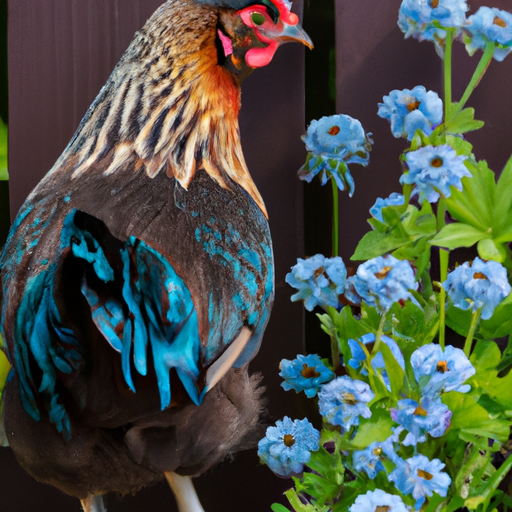In the world of poultry farming, one question that has always intrigued poultry farmers is, “Are there specific chicken breeds more resistant to common poultry diseases?” Keeping your flock healthy and disease-free is an ongoing challenge, but could certain breeds have an extra advantage? This article explores the possibility of certain chicken breeds possessing a higher resistance to common poultry diseases, providing valuable insights for poultry farmers looking to improve the overall health and well-being of their feathered friends. So, let’s dive into the fascinating world of chicken breeds and disease resistance!
Chicken Breeds
When it comes to raising chickens, there are various breeds to choose from. Each breed has its own unique characteristics, including its appearance, temperament, and egg-laying abilities. In this article, we will explore three main categories of chicken breeds: heritage breeds, commercial breeds, and rare breeds. By understanding the different breeds, you can make an informed decision about which chickens are the best fit for your flock.
Heritage Breeds
Heritage breeds are traditional breeds that have been raised by farmers for centuries. These breeds have a rich history and can often be traced back to a specific region or country. One of the advantages of heritage breeds is their ability to adapt to different environments. They are often hardy and have a strong immune system, which makes them less susceptible to diseases. Some popular heritage breeds include Ameraucana, Dominique, and Rhode Island Red.
Ameraucana
Ameraucanas are known for their beautiful blue-colored eggs and fluffy feathers. They are a docile breed and make great pets. Ameraucanas are also quite adaptable and can tolerate both hot and cold climates.
Dominique
The Dominique breed is one of the oldest American chicken breeds. They have distinctive black and white striped feathers, which make them a unique addition to any flock. Dominiques are known for their good foraging abilities and adaptability to various environments.
Rhode Island Red
Rhode Island Reds are a popular heritage breed due to their great egg-laying abilities. They are known for laying brown eggs consistently and are excellent for both meat and egg production. Rhode Island Reds are also known for their hardiness and ability to withstand cold temperatures.
Commercial Breeds
Commercial breeds, also known as production breeds, are specifically bred for high egg or meat production. These breeds have been genetically selected to maximize economic efficiency in commercial poultry operations. While their productivity is impressive, some commercial breeds may be more prone to diseases due to their intensive breeding practices. Three popular commercial breeds are Cornish Cross, White Leghorn, and Plymouth Rock.
Cornish Cross
Cornish Cross breeds are commonly used for meat production. They grow rapidly and have a high feed conversion rate, which means they efficiently convert feed into muscle mass. However, due to their fast growth rate, they can be more susceptible to certain health issues, including leg disorders.
White Leghorn
White Leghorns are well-known for their exceptional egg-laying capabilities. They are small, active, and efficient layers of white eggs. These chickens are hardy and thrive in free-range environments. However, because of their larger population densities in commercial operations, they may be at a higher risk of disease transmission.
Plymouth Rock
Plymouth Rocks are dual-purpose breeds, meaning they are suitable for both meat and egg production. They have a friendly and calm temperament, making them great for backyard flocks. Plymouth Rocks are also known for their high egg production, laying brown eggs consistently.
Rare Breeds
Rare breeds, as the name suggests, are breeds that are at risk of becoming extinct. These breeds often have unique physical characteristics and are valued for their historical and cultural significance. By raising rare breeds, you can contribute to their preservation and enjoy the benefits of owning a truly unique flock. Some rare breeds include Sultan, Crevecoeur, and Andalusian.
Sultan
Sultans are a small and ornamental breed known for their distinctive appearance. They have feathered legs and a large crest on their heads. Sultans are primarily kept for exhibition purposes and are known for their friendly nature.
Crevecoeur
Crevecoeurs are an ancient French breed valued for their striking black plumage. They were once bred for both meat and egg production but are now primarily kept for ornamental purposes. Crevecoeurs have a calm temperament and are known for being good foragers.
Andalusian
Andalusians are known for their beautiful blue feathers and elegant appearance. They are a Mediterranean breed that adapts well to warmer climates. Andalusians are primarily kept for their egg-laying capabilities, as they consistently produce large white eggs.
Common Poultry Diseases
Now that we’ve explored different chicken breeds, let’s discuss some common poultry diseases that you should be aware of when raising chickens. Keep in mind that while certain breeds may have better resistance to diseases, proper management and preventative measures are essential for maintaining a healthy flock.
Avian Influenza
Avian influenza, also known as bird flu, is a highly contagious viral disease that affects birds, including chickens. It can cause severe illness and even death in infected birds. The symptoms of avian influenza can vary, but they often include respiratory distress, decreased egg production, and sudden death. To prevent avian influenza, it is crucial to practice strict biosecurity measures, including restricting contact between your birds and potential sources of infection, such as wild birds.
Newcastle Disease
Newcastle disease is another highly contagious viral disease that affects poultry worldwide. It can cause respiratory, nervous, and digestive signs in infected birds. Symptoms may include coughing, sneezing, diarrhea, and paralysis. Vaccination is an effective preventive measure against Newcastle disease, and it is important to follow recommended vaccination schedules for your flock. Additionally, practicing good biosecurity, such as disinfecting equipment and keeping wild birds away from your flock, can help prevent the spread of Newcastle disease.
Infectious Bronchitis
Infectious bronchitis is a respiratory disease caused by a coronavirus. It primarily affects the respiratory system of chickens and can cause coughing, sneezing, nasal discharge, and reduced egg production. Vaccination is widely used to prevent and control infectious bronchitis, but it is essential to ensure that the vaccine matches the prevailing strains of the virus in your area. Biosecurity measures, such as keeping new birds isolated and maintaining good sanitation practices, can also help prevent the spread of infectious bronchitis.
Factors Influencing Disease Resistance
Now that we understand some common poultry diseases, let’s explore the factors that can influence disease resistance in chickens. By recognizing these factors and implementing appropriate measures, you can help ensure the health and well-being of your flock.
Genetics
Genetics plays a significant role in disease resistance. Some chicken breeds naturally have better immune systems and resistance to certain diseases. Heritage breeds, in particular, often have a stronger immune response due to their long history of adaptation and survival. However, it is important to note that genetic factors alone may not guarantee disease resistance, as proper husbandry practices and management are crucial.
Vaccination
Vaccination is an effective tool in preventing the spread of certain diseases. By vaccinating your chickens, you can enhance their immunity and reduce the risk of disease transmission within your flock. Consult with a veterinarian to determine the appropriate vaccination schedule for your specific needs. It’s important to keep accurate records of vaccinations to ensure timely boosters and prevent any gaps in protection.
Biosecurity Measures
Biosecurity measures are crucial for minimizing the risk of disease introduction and spread within your flock. They involve implementing practices that reduce the likelihood of pathogens entering your premises and infecting your birds. Some biosecurity measures include quarantine protocols for new birds, proper sanitation practices, and predator control. By diligently following these measures, you can significantly reduce the risk of disease outbreaks.
Biosecurity Measures
Biosecurity measures are crucial for maintaining the health and biosecurity of your flock. Implementing proper practices can help prevent the introduction and spread of diseases. Here are three essential biosecurity measures to consider.
Quarantine Protocols
When introducing new birds to your flock, it’s important to implement quarantine protocols. Quarantine allows you to observe and monitor new birds for any signs of illness before integrating them with the rest of the flock. Ideally, quarantine should last for a minimum of 30 days. During this time, keep the new birds in a separate area, away from your existing flock, and ensure that all equipment and supplies used on the quarantine birds are not shared with the rest of the flock.
Sanitation Practices
Maintaining proper sanitation practices is crucial for preventing the spread of diseases. Regularly clean and disinfect your coop, equipment, and feeding/watering areas to minimize the presence of pathogens. Use appropriate disinfectants and follow the recommended protocols for effective cleaning. Good hygiene also includes washing your hands thoroughly before and after handling chickens to prevent any potential cross-contamination.
Predator Control
Predator control is an important aspect of biosecurity to protect your flock from potential threats. Predators, such as foxes, raccoons, and hawks, can introduce diseases or physically harm your birds. Implement measures such as secure fencing, predator-proof locks, and periodic checks of your coop and surrounding area to keep predators at bay. Remember, a secure and safe environment is essential for the overall health and well-being of your flock.
In conclusion, understanding different chicken breeds and the common poultry diseases they may be susceptible to is crucial for successful chicken keeping. While certain heritage breeds may have better resistance to diseases, it’s important to implement proper management practices such as vaccination and biosecurity measures to maintain a healthy flock. By considering these factors and taking proactive steps, you can enjoy the benefits of raising chickens while minimizing the risk of diseases affecting your birds.




